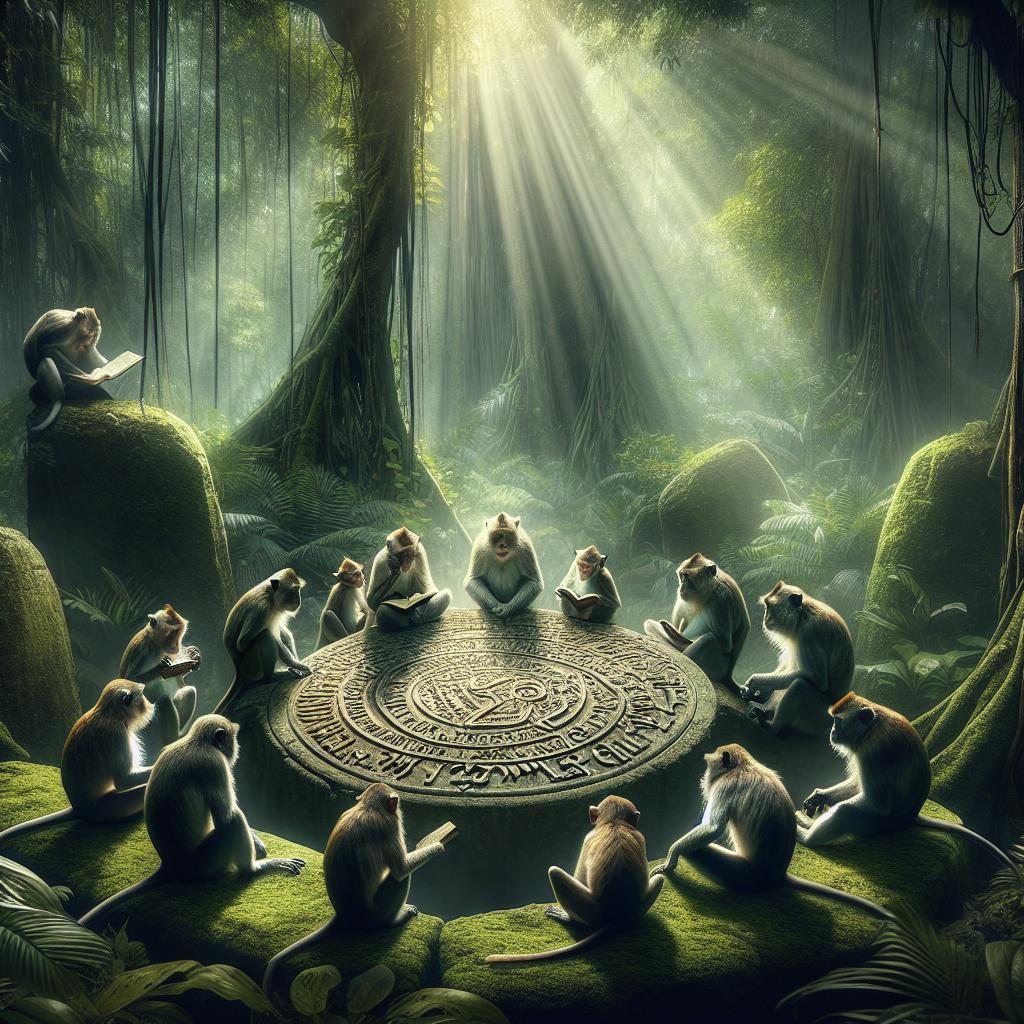
Divine Wonder: Could Monkeys Type the 23rd Psalm? Unveiling God's Majesty
Published: 23 June 2024
Could Monkeys Type the 23rd Psalm?
The question of whether monkeys could type the 23rd Psalm is an intriguing one that touches on the idea of chance versus design in the origins of life. This debate has been ongoing since the publication of Charles Darwin's "Origin of Species" in 1859 and continues to be a topic of discussion among evolutionists and Christians alike. In this article, we will delve into this question from a staunchly conservative, biblical perspective, examining the arguments put forth and providing a comprehensive analysis.
Key Questions
1. What was Thomas Huxley's argument regarding monkeys typing the 23rd Psalm?
Thomas Huxley, known as "Darwin's bulldog," argued that given enough time, six eternal monkeys or apes typing on six eternal typewriters with unlimited paper and ink could produce the 23rd Psalm or any other literary work purely by chance. He used this argument to illustrate his belief that molecular movement, given enough time and matter, could produce complex organisms like humans without the need for a Designer or Creator.
2. What was Bishop Samuel Wilberforce's response to Huxley's argument?
Bishop Samuel Wilberforce, an Anglican theologian and mathematician, responded to Huxley's argument by invoking the watchmaker analogy proposed by William Paley. Wilberforce argued that just as a watch implies the existence of a watchmaker, design in nature implies the existence of a Designer. However, it is noted that Wilberforce did not have a strong counter-argument to Huxley's line of reasoning.
3. What is the probability of monkeys typing the 23rd Psalm by random chance?
To calculate the probability of monkeys typing the 23rd Psalm by randomly striking keys on a typewriter, we can use the principles of probability theory. Assuming a special typewriter with 50 keys (capital letters, numbers, symbols), the probability of correctly typing the three letters "THE" from all possibilities is 1 in 125,000. The average time taken to make 125,000 strikes at a rate of one strike per second is approximately 34.72 hours. Extending this calculation to the entire 23rd Psalm, which contains 603 letters, verse numbers, punctuation, and spaces, the average time taken would be an astronomical figure of approximately 9.552 x 10^1016 years.
4. How does the probability of monkeys typing the 23rd Psalm compare to the age of the Earth and the universe?
The probability of monkeys randomly typing the entire 23rd Psalm is vastly higher than the estimated age of the Earth (4.6 billion years) and the universe (almost 15 billion years). This comparison underscores the implausibility of chance alone being responsible for the complex information contained in a literary work like the 23rd Psalm.
5. What are the probabilities involved in the formation of a DNA molecule by chance?
When we apply probability theory to the correct arrangement of a DNA molecule, we encounter similarly mind-boggling numbers. The unique sequence of base pairs in a DNA chain represents a choice of one out of 10^2,000,000 alternative ways of arranging these bases. The spontaneous formation of a complete bacterium of Escherichia coli in the history of the universe has been calculated to have a probability of less than one chance in 10^100 billion. These probabilities further support the notion that chance alone is an insufficient explanation for the origins of life.
6. Can natural selection increase the probability of life forming by chance?
While natural selection can play a role in shaping and preserving existing life forms, it cannot work on non-living chemicals or contribute to the initial formation of life. Natural selection requires a living organism capable of reproduction, so it cannot be invoked to explain the origin of life itself.
7. Does the concept of an eternal universe address the problem of probability?
Some evolutionists propose that an eternal universe would guarantee that any event, no matter how unlikely, would occur given enough time. However, the idea of an eternal universe is not substantiated by scientific evidence, as the universe is slowly approaching "heat death" in accordance with the second law of thermodynamics. The fact that the universe is not dead suggests that it is not infinitely old.
8. What are the limitations of Huxley's argument and the idea of biogenesis by chance?
Huxley's argument, as well as the idea of biogenesis by chance, fail to consider important factors. Firstly, reversible reactions, such as those involved in the formation of proteins from amino acids, are inhibited by excess water and favor the breakdown of products. This means that chance combinations of living matter could not produce the complexity and information contained within living cells. Secondly, the concept of "somewhere, sometime" does not hold up under scrutiny because probabilities approaching zero cannot be considered certain to occur. The models proposed by Huxley and his supporters lack falsifiability and violate fundamental scientific principles. In conclusion, the question of whether monkeys could type the 23rd Psalm highlights the debate between chance and design in the origins of life. The probabilities involved in monkeys typing a literary work like the 23rd Psalm or in the spontaneous formation of life by chance are astronomically low. The intricate complexity and information contained within living organisms suggest the involvement of an external intelligence or Creator. As conservative Christians, we can find affirmation for this viewpoint in both scientific evidence and biblical teachings. By exploring these questions and examining the arguments from a biblical perspective, we can gain a deeper understanding of the limitations of chance and the compelling evidence for an intelligent Designer.
